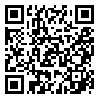1. 1. Basharpoor S, Drodi J, Mahmoodzadeh S. The role of brain-behavioral systems and morningness-eveningness types in predicting students’ academic achievement. Educational Psychology. 2018;14(49):203–20. [Persian] [
DOI]
2. 2. Oguchi M, Takahashi F. Behavioral inhibition/approach systems constitute risk/protective pathways from ADHD symptoms to depression and anxiety in undergraduate students. Personality and Individual Differences. 2019;144:31–5. [
DOI]
3. 3. Merchán-Clavellino A, Alameda-Bailén JR, Zayas García A, Guil R. Mediating effect of trait emotional intelligence between the Behavioral Activation System (BAS)/Behavioral Inhibition System (BIS) and positive and negative affect. Front Psychol. 2019;10:424. [
DOI]
4. 4. Ide JS, Li H-T, Chen Y, Le TM, Li CSP, Zhornitsky S, et al. Gray matter volumetric correlates of behavioral activation and inhibition system traits in children: An exploratory voxel-based morphometry study of the ABCD project data. NeuroImage. 2020;220:117085. [
DOI]
5. 5. Liu G, Cheng G, Hu J, Pan Y, Zhao S. Academic self-efficacy and postgraduate procrastination: a moderated mediation model. Front Psychol. 2020;11:1752. [
DOI]
6. 6. Towhidi A, Karimi Bahrasmani A. The effectiveness of attention training on math academic achievement and academic self-efficacy in students with borderline intelligence quotient. Middle Eastern Journal of Disability Studies. 2018;8:45. [Persian] [
Article]
7. 7. Saadat S, Asghari F, Jazayeri R. The relationship between academic self-efficacy with perceived stress, coping strategies and perceived social support among students of University of Guilan. Iranian Journal of Medical Education. 2015;15:67–78. [Persian] [
Article]
8. 8. Nazaripour A, Laie S. Reverse learning on academic self-efficacy and mathematical learning in students with learning disabilities. Middle Eastern Journal of Disability Studies. 2020;10:7. [Persian] [
Article]
9. 9. Bedel EF. exploring academic motivation, academic self-efficacy and attitudes toward teaching in pre-service early childhood education teachers. Journal of Education and Training Studies. 2015;4(1):142–9. [
DOI]
10. 10. Agha Yoosefi A, Khodaie A, Shokri O. Academic stress, academic self-efficacy and academic achievement among undergraduate students title. Journal of Educational Psychology Studies. 2014;10(18):41–66. [Persian] [
DOI]
11. 11. Erdle S, Rushton JP. The General Factor of Personality, BIS–BAS, expectancies of reward and punishment, self-esteem, and positive and negative affect. Personality and Individual Differences. 2010;48(6):762–6. [
DOI]
12. 12. Purkord M, Abolghasemi A, Narimani M, Rezaee H. Direct and indirect impact of self-efficacy, impulsivity, behavioral activation-inhibition and social skills on substance abuse in students. Scientific Quarterly Research on Addiction. 2013;7(26):11–28. [Persian] [
Article]
13. 13. Lim S-M, Hong E-J, Yang I-H, Lim J-K. Correlation of behavioral inhibition/activation system about science learning to self-efficacy. Journal of The Korean Association For Science Education. 2011;31(5):758–69. [Korean] [
DOI]
14. 14. Hassanzadeh R. Research methods for behavioral sciences. Tehran: Savalan Pub; 2011. [Persian]
15. 15. Carver CS, White TL. Behavioral inhibition, behavioral activation, and affective responses to impending reward and punishment: The BIS/BAS Scales. Journal of Personality and Social Psychology. 1994;67(2):319–33. [
DOI]
16. 16. Abdollahi R, Bakhshipour R, Mahmoodaliloo M. Validity and reliability of Behavioral Inhibition and Activation Systems (BIS/BAS) scales among Tabriz university students. Journal of Modern Psychological Researches. 2013;7(28):123–39. [Persian] [
Article]
17. 17. Jinks J, Morgan V. Children’s perceived academic self-efficacy: an inventory scale. The Clearing House: A Journal of Educational Strategies, Issues and Ideas. 1999;72(4):224–30. [
DOI]
18. 18. Mazaheri Z, Sadeghi A. Development and evaluating the reliability and validity of the students’ academic self-efficacy questionnaire. New Educational Approaches. 2016;10(2):61–80. [Persian] [
Article]
19. 19. Mautz CP, Hill RW, Hueslman TJ, Bazzini DG. Behavioral activation and behavioral inhibition predict perfectionism. Psychology and Behavioral Sciences. 2017;6(4):59. [
DOI]







